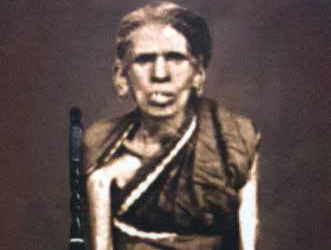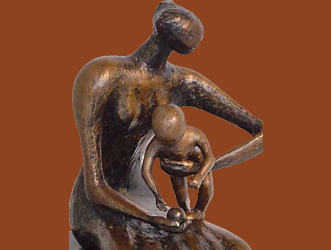Issue No.12 / August 16,2015

For centuries, a Mother has come to be seen as an epitome of selfless love. She is attributed with qualities so divine that a famous Jewish proverb says, “God couldn’t be everywhere, so he created Mothers.” Indeed, Mothers are a ubiquitous fraternity and quite paradoxically, most sons love to hate and hate to love them when they are around! Posthumously, most of us remember our Mothers more fondly, realising their true worth as birth-givers and the ones who had been at the receiving end of the ups and downs that their families go through.
Pardon me if this seems like a sweeping statement, but they are based not only on my observations in day-to-day life but also on research done by several scholars and psychologists across the world, on the mysterious and complex mother-son relationship.
In a thesis titled, ‘Sons’ Remembered Communication Experiences With Their Mothers: A Research Proposal’ by Sheila A. Bray, the author quotes several researchers and scholars who have psycho-analysed this relationship.
Bray refers to Michael Gurian, a pioneer in the study and application of gender studies whose findings state that “the vast majority of men admit to needing to work on the relationship with their mothers: on boundaries, on feelings of guilt about their mothers, and on issues concerning a wife’s/partner’s role in relation to their mother’s role.” He writes of the mother-son bind; a relationship in which the adolescent son wants to destroy the emotional dependence on his mother while at the same time retain it.
Kindlon and Thompson (1999), in ‘Raising Cain’, state that a mother has tremendous psychological power and that the emotional bond a man has with his mother is likely to be the most deeply rooted connection in his life. For many boys she is the only person they can trust.
The way in which man sees the world, the people in it - all the relationships they are ever likely to have, is welded to the bond with their mothers. This bond, this relationship is the cornerstone of all future relationships. Yet it is a bond infused with and surrounded by misunderstandings, fears, and a dark, almost unfathomable mythology - Olson , in ‘Sons and Mothers’

“The way in which men see the world, the people in it - all the relationships they are ever likely to have is welded to the bond with their mothers. This bond, this relationship is the cornerstone of all future relationships. Yet it is a bond infused with and surrounded by misunderstandings, fears, and a dark, almost unfathomable mythology. It is perhaps the most misunderstood, misconstrued, and puzzling relationship of all, because by the very process of being reared in its mystique men can barely see it all; there seems to be a prohibition against seeing it clearly.
Druck (1985) adds: “Men do not often discuss their unresolved feelings about their mothers. While they play a key part in their relationships with other women, these emotions are often hidden away out of our awareness. Men’s deepest feelings toward their mothers remain some of their best-kept secrets, even from themselves. Yet a large part of what men expect from women, and of themselves as men, dates back to their childhood experiences with their mothers.’’
Today, my mother is no more, but I remember and respect her more fondly than I did when she was in flesh and blood. I have named the auditorium at Sri Balaji Society campus in her memory. However, I would like to share my first-hand experience, where, when she was alive, I had bitter feelings towards her for dividing the family; of causing a rift between my two maternal uncles and for being harsh to my elder uncle’s family. I confess to having performed the duty of an adult son quite mechanically and with little affection – whether it be sending Money Orders regularly to her ever since I began serving in the Army and thereafter; or being there when she needed me.
Whoever we are in the corporate world, the Mother Factor is one that concerns one and all in various measures of love, hate, anger and gratitude. Hence, I thought, this topic, being so universal in nature and one which every boy or man can identify with, needs to be spoken and debated, instead of being suppressed within our deep psyche.

My mother is no more, but I remember and respect her more fondly than I did when she was in flesh and blood. I have named an auditorium in her memory. I confess to having performed the duty of an adult son quite mechanically – like sending her financial help or being there whenever she needed me.
While my sister and I were well looked after by my mother, I guess my resentment began after the marriage of my elder Mama (uncle), who, like my father, would visit the village once in four to five years and on one such occasion, got married. He left his wife behind and over the years they were blessed with two daughters and a son.
My mother began to take particular dislike to my elder Mama’s wife (my Mami). Quarrels and arguments became the norm and the peace of the house was lost. My mother constantly harassed my Mami. My elder uncle, who loved his sister immensely, was pained by her brutality and decided it was time to sever ties with her. He constructed a house in the same village, and shifted his family out. The family split. My mother too had no qualms about severing all connections with my elder Mama and his family. I was banned from communicating with them. Silently, I witnessed the domestic rift over the years. It hurt me deeply, as I loved my elder Mama for his kindness and generosity. I was deeply agonised that I would never meet him. In the meanwhile, although he had cut himself off from my mother, he used to clandestinely send financial help to my younger Mama without the knowledge of my mother. So, love was not lost between my Mamas, despite the family rift!
Now, the rift between my mother and my Bada Mama further widened when my younger Mama got married to my sister. So he was left alone with his family while now my mother also became a relative-in-law to her daughter. Bada Mama used to come from Singapore once in five years, but I was banned from meeting him. Later, after I joined the Army, I was not present in the village when he came for his holiday. However, whenever I came to the village on my annual leave, I used to look up my Mami, who was very fond of me. The fact that there was a rift in the family always bothered me and I always considered my mother as the chief villain.
On one occasion though, Bada Mama happened to visit the village when I too was on my annual leave. I was married by then. I was very keen that both brothers should meet and make up. I convinced my mother about the reunion and invited all of them over for a meal. Emotions ran high and everybody was crying out of affection as well as guilt.
After the meal, my Bada Mama called me over to his house and questioned me about the reason for my mother’s animosity towards him, angry that he and his family were singled out by her hatred. Nevertheless, he appealed to me that at least my generation should patch up and not bear any grudge as his generation had. Incidentally, that was to be the proverbial last supper, as my Bada Mama died two months later. Thereon, after several years, my younger Mama suffered a paralytic attack and I looked after him for five years before he passed away. Here too I witnessed indifference towards my younger Mama’s care, even by my own sister. So, I often wonder about the state of our society where every kind of personal relationships seem to have reached the nadir. I hope my dreams of building an old age home will be realised, so as to offer solace to the elderly who are unwanted by their near and dear ones. Deep within, my younger Mama too suffered the pangs of separation with his elder brother. During one of my trips to see him, he too appealed that I should not forget Bada Mama’s family. So, in a sense, both my Mamas were deeply afflictedwith the friction and fissures that broke the family apart.
My story comes from a rural backdrop but today’s family serials on television also showcase the complexities of love-hate relationships revolving around mothers and mothers-in-law in the urban landscape. Hence, as a scholar observes, by sharing personal experiences, the opportunity is presented for developing healthier relationships
On hindsight, I feel my mother’s ears were poisoned by relatives and villagers who ensured, perhaps out of jealousy and viciousness, that our family stayed divided. After her death, I have turned magnanimous over her actions, believing that she must have been misguided. Ironically, I also remember her for being a loving mother and taking care of me. I seem to have pardoned her for her misdeeds and, like I said, honoured her by naming an auditorium in her memory.
My story comes from a rural and illiterate backdrop but today’s family serials on television also showcase the complexities of domestic love-hate relationships revolving around mothers and mothers-in-law in the urban landscape. Hence, Shaila A Bray’s research paper aptly summarises thus: “The mother-son relationship is complex, in many ways unknown and not understood, and warrants research. Studies such as this increase the possibility of talking about this relationship in ways other than previously talked about. By sharing personal experiences, by understanding distinct types of relationships and communication behaviours within each of them, the opportunity is presented for developing healthier and more satisfying relationships.”
I have observed that daughters are preferred over sons. Is it justified? In my case it was my sister who looked after my mother till the very end as I was away on military service. Generally, that is what usually happens with men who leave home to pursue a career. But why is it that everything is acceptable from a daughter? My sister, for example, was very manipulative. Yet, my mother hardly had any ill feelings towards her.
Noted psychoanalyst Dr Meryle Gellman perhaps answers my curiosity when he states in his blog, “The impact a mother and daughter have on one another seems to be timeless. No matter how old each one is, they seem to trigger enormous amounts of emotional energy. Both are activated by female hormones, oestrogen and progesterone. A little girl is nurtured by these hormones, and a blueprint is established for the rest of her life. A girl’s brain seems to be wired differently from a brother’s and a father’s, and girls seem to just thrive from staying within a relationship (with their mother). Self-esteem seems to be enhanced by feeling as though a girl is a part of a relationship.”
Dr (Col.) A. Balasubramanian
editor-in-chief